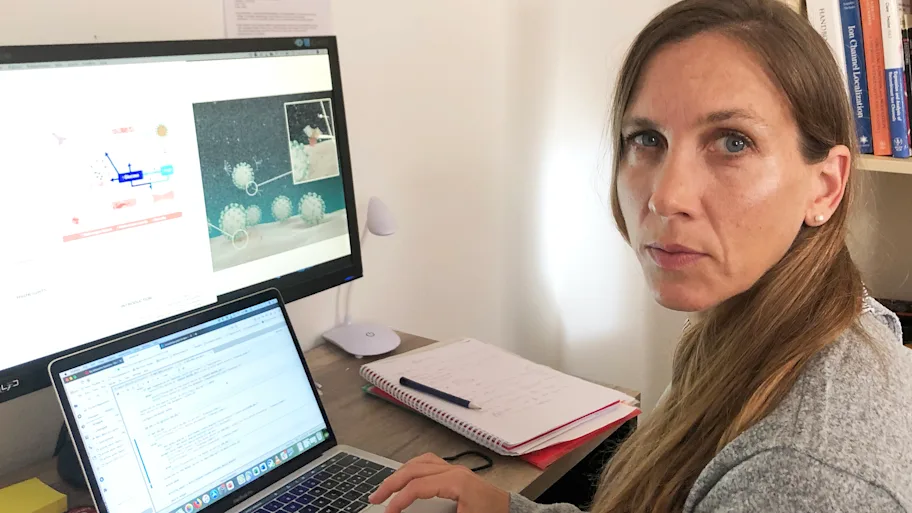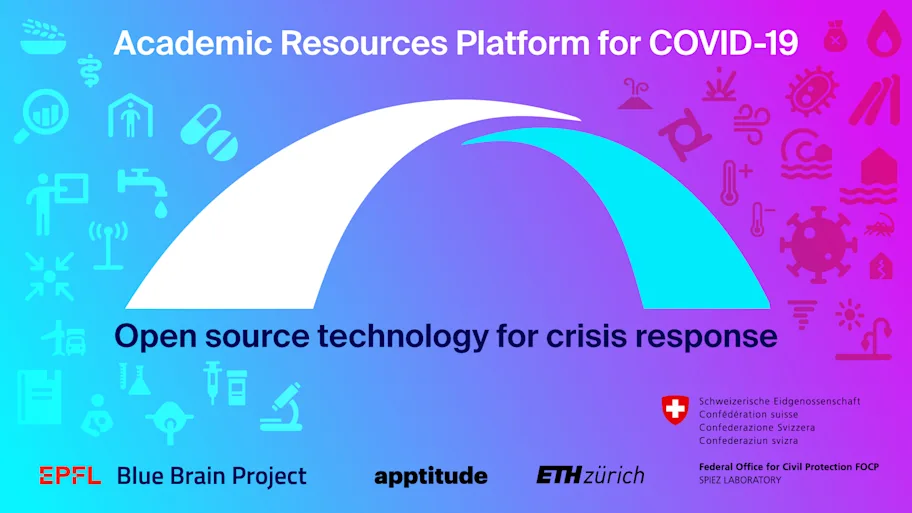
- Science news
- Featured news
- Machine learning and knowledge engineering uncovers significant role of elevated blood glucose in severe Covid-19
Machine learning and knowledge engineering uncovers significant role of elevated blood glucose in severe Covid-19
By Colm Gorey, Frontiers' Science Communications Manager

A digital reconstruction of SARS-CoV-2 primary infection in the lungs. Image: Blue Brain Project/EPFL 2005-2021. All rights reserved
Why does Covid-19 present itself more severe in some patients but not in others? The question has puzzled researchers and clinicians since the start of the pandemic, but now new research from the EPFL Blue Brain Project may have found a major clue to solving the mystery thanks to machine learning. Analyzing data extracted from 240,000 open access scientific papers, the findings of a paper published in Frontiers revealed the previously undiscovered roles elevated blood glucose levels have in the severity of Covid-19.
What makes one person more at risk of developing severe Covid-19 than someone else? While it is widely accepted that elderly people are the most at-risk during the current pandemic, many young, seemingly healthy people have also been hospitalized by the disease.
A number of preexisting conditions are known to contribute to the severity of the disease – such as diabetes, obesity and hypertension – but a more recent finding has highlighted the impact of blood glucose levels among both diabetic and non-diabetic people.
Yet the role that glucose plays in the progression of the disease and the importance of managing glucose levels in the aging population, people with diabetes and the general public, was unclear.
Now however, researchers working at the Blue Brain Project based at École Polytechnique Fédérale de Lausanne (EPFL) in Switzerland have used the incredible power of machine learning and knowledge engineering to identify our first major clue to solving this mystery. In doing so, their findings could lead to new ways of both treating and managing the disease in those most at risk.

Click on the infographic for a larger version. Image: 5W Infographics/Frontiers
A vast database
Publishing their findings in Frontiers in Public Health, Dr Emmanuelle Logette and Prof Henry Markram, along with a group of Blue Brain Project researchers, developed machine learning models to mine 240,000 scientific articles openly accessible in the CORD-19 database.
Considered a shining example of open access research, the CORD-19 database was launched by the US government, the Chan Zuckerberg Initiative, Microsoft Research and others in the midst of the pandemic to create a hub of Covid-19 research that could be easily readable by machine learning algorithms.
With these machine-readable resources accessible and available for data analysis, the worldwide machine learning community has the opportunity to apply recent advances in natural language processing to find answers to questions within, and connect insights across, this content in support of the ongoing fight against this infectious disease.
Using specially developed machine learning algorithms, the Blue Brain Project team detected a recurring trend across the data in the literature among those with severe Covid-19: elevated blood glucose (BG) levels.
Out of 400,000 unique entities identified, ‘glucose’ appeared 6,326 times allowing the researchers to explore its role further across many levels, from the most superficial symptomatic associations to the deepest biochemical mechanisms implicated in Covid-19.
Soon thereafter, patterns emerged in the data to show just how impactful elevated blood glucose levels are in the body’s defense against the SARS-CoV-2 virus and Covid-19 disease.
Download original article (pdf)
Key findings
Elevated BG impairs the ‘first responders’ of our lungs’ immune defense, making the ideal conditions for SARS-CoV-2 to spread.
Elevated BG causes dysregulations in the immune response that facilitates the cytokine storm and acute respiratory distress syndrome (ARDS).
Complications caused by Covid-19 – such as hyperinflammation and pro-coagulation – were brought on by elevated BG levels.
Elevated BG works synergistically with SARS-CoV-2-dependent inactivation of ACE 2 to escalate the disease to multi-organ failure and thrombotic events.
The CORD-19 dataset, combined with existing knowledge on the role of glucose in related pathologies, provides an even more compelling case that elevated BG levels are a pre-condition for severe Covid-19.
“The importance of elevated glucose levels compromising the very first defense of the lung as the key barrier to contain the virus and prevent an avalanche of infection and complications, is underappreciated in the CORD-19 database,” they wrote.
They stated that the potential importance of elevated BG levels in providing SARS-CoV-2 the ideal conditions to coat the spike protein and bypass the immune system was “not clearly recognized”.
“It required piecing together numerous lines of evidence across multiple sources to reveal how elevated glucose could be involved in the complications of the disease, such as driving the immune response into a cytokine storm and participating in the dysregulation of coagulation and thrombotic features.”
“Management of Covid-19, to some extent, considers management of glucose as an important component. But if this hypothesis is correct, glucose management may need to become a core strategy.”
With more than 80% of Covid-19 patients in intensive care units reported as being hyperglycemic, the researchers now encourage “tight control and management” of glycemia to give them potentially better outcomes.
One potential treatment option for at-risk patients is the use of metformin, a common, FDA-approved drug for glucose management.
Aside from just lowering glucose levels, metformin also has some anti-inflammatory effects by reducing C-reactive protein levels, a biomarker for poor prognosis for the disease. It also provides cardiovascular protective, vasodilative and anti-thrombotic effects. Pending further clinical trials with non-diabetic people, these factors – in addition to other positive outcomes brought by metformin – suggest it may be protective against SARS-CoV-2 infection in at-risk patients.
Win for open science
The machine developed as part of this breakthrough research is still early in its development cycle, requiring human curation of the data it gathers. And yet, with further enhancement, the researchers are confident it will play a significant role in answering more mysteries surrounding Covid-19 and other diseases.
“Despite the shortcomings of the approach, it is today the only way to obtain a community view of the contents of such a vast literature dataset and it did allow us to extract a powerful community consensus on the role of glucose in the infection that has far reaching potential implications for this in future pandemics,” they wrote.
“Rigorous clinical studies are therefore called for to determine whether elevated glucose is in fact the predominant underlying driver of disease severity.”
According to Markram, the vast quantity of research that the Blue Brain Project’s machine was able to tap into is a testament to the possibilities of open science.
“Is it right to only make publicly funded science papers open to the public during a pandemic when the same kind of techniques can be used to help address so many other diseases, accelerate science, and help save the planet from climate change?” he said.
REPUBLISHING GUIDELINES: Open access and sharing research is part of Frontiers’ mission. Unless otherwise noted, you can republish articles posted in the Frontiers news blog — as long as you include a link back to the original research. Selling the articles is not allowed.






